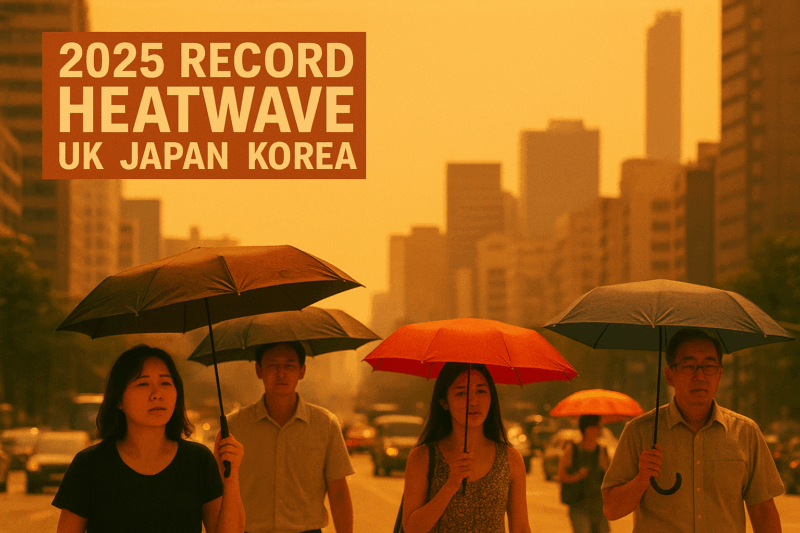In 2025, the UK, Japan, and South Korea endured their hottest summers on record, with temperatures soaring to unprecedented levels, driven by escalating global warming. The UK averaged 16.2°C, Japan hit a 2.4°C anomaly, and South Korea reached 25.8°C, reshaping daily life and economies. This 2025 record heatwave UK Japan Korea signals a deepening climate emergency. Focus keywords: 2025 record heatwave UK Japan Korea, global warming 2025 impacts, UK summer heat 2025, Japan extreme heat 2025, Korea climate crisis 2025.
Human Stories
Lives Disrupted
In London, 19-year-old student Aisha Khan described sweltering in her un-air-conditioned flat, unable to study during the UK summer heat 2025. “It felt like living in an oven,” she said. In Japan, 65-year-old farmer Hiroshi Tanaka lost half his rice crop to Japan extreme heat 2025, with 90,000 heatstroke cases reported by August. In South Korea, Busan resident Ji-won Park faced water shortages during the Korea climate crisis 2025, with reservoirs at 12% capacity.
Community Struggles
The heatwave stirred anxiety across regions. South Korea’s 24 tropical nights in Seoul disrupted sleep, while Japan’s early cherry blossoms disappointed tourists. UK farmers reported a 15% crop yield drop, raising grocery prices. “We’re losing our way of life,” said Kyoto resident Emi Sato, 45, lamenting cultural shifts, per a local survey showing 70% of residents feel climate impacts daily.
Data Points
Temperature Records
The 2025 record heatwave UK Japan Korea set stark benchmarks. The UK’s 16.2°C June-August average surpassed 2024’s record by 1.6°C, with six heatwaves, per the Met Office. Japan’s 2.4°C above the 1991-2020 baseline marked its hottest summer since 1898, with Osaka hitting 36°C for 12 days. South Korea’s 25.8°C average, coupled with a Gangneung drought, broke 2023’s record, per the Korea Meteorological Administration.
Scientific Insights
NOAA attributes these extremes to human-driven emissions, with a Climate Shift Index of 4 indicating the heat was four times more likely due to global warming. The UN notes a 3% productivity loss per degree above 20°C in Asia, impacting economies. Europe and Asia are warming 1.5 times faster than the global average, per Climate Central.
Environmental Context
Wider Consequences
The global warming 2025 impacts included Japan’s Mount Fuji remaining snowless until October 2024, disrupting tourism. South Korea’s drought halted 80% of Gangneung’s water supply, while UK floods followed heatwaves, damaging infrastructure. These events, linked to Arctic warming, signal a 25% increase in extreme weather frequency by 2030, per the IPCC.
Future Outlook
Path Forward
The Korea climate crisis 2025 and counterparts in the UK and Japan demand urgent action. Japan plans solar-powered cooling centers, while the UK targets net-zero public transport by 2030. South Korea’s $10 billion climate fund aims to bolster water infrastructure. Without global emission cuts, 2026 summers could be 10% hotter, per NOAA, threatening a 6% GDP loss in Asia by 2035.
FAQ
What caused the 2025 heatwave in the UK, Japan, and South Korea?
The 2025 record heatwave UK Japan Korea was driven by global warming, with emissions making extreme temperatures four times more likely, per NOAA.
How did the 2025 heatwave affect economies and tourism?
The global warming 2025 impacts cut UK crop yields by 15%, raised Japan’s heatstroke cases to 90,000, and slashed South Korea’s tourism by 20% due to drought.
Conclusion
The 2025 record heatwave UK Japan Korea brought unprecedented temperatures, with the UK summer heat 2025 at 16.2°C, Japan extreme heat 2025 at 2.4°C above average, and Korea climate crisis 2025 triggering severe droughts. These global warming 2025 impacts disrupted lives, from crop losses to tourism declines. Urgent climate solutions are needed to prevent worse outcomes in 2026. Focus keywords: 2025 record heatwave UK Japan Korea, global warming 2025 impacts, UK summer heat 2025, Japan extreme heat 2025, Korea climate crisis 2025.






